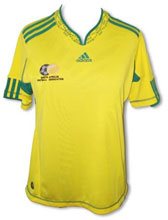When Bafana Bafana was drawn to play previous world champions France and Uruguay, along with Mexico, at the Final FIFA Draw in Cape Town, many international football pundits were quick to write off South Africa's chances of advancing to the second round.
However, recent history has shown that the hosting team can draw upon one player that the other teams will not be able to field: the much famed 12th man, in other words the support of the hosting nation.
Collective energy transformation
Possibly the most profound testimony to the effect of the collective energy transformation that can take place between the hosting team and the nation, has been the South Korean team at the 2002 FIFA World Cup, which was co-hosted by Korea and Japan. Having participated at six previous FIFA World Cups, Korea had not won a single game and many predicted a first-round exit for the team of coach Guus Hiddink.
In a series of international matches against teams such as reigning champions France and the Czech Republic, which each beat Korea 5-0, the low point was reached when the squad succumbed 2-1 to Canada (which was ranked 50 places below Korea at the time) just months before the World Cup kick-off. Newspapers called for coach Hiddink's head, railing at him for cruelly pitting the Koreans against superior sides.
Player No 12
However, Hiddink could count on the support of one key stakeholder - the official fan club of the Korean team, dubbed the “Red Devils” (Bulgeun Ahgma). Founded in 1983, when Korea sprung a surprise by making it to the semi-finals of the FIFA Youth World Championships in Mexico, the Red Devils didn't call themselves fans but rather demanded to be recognised as part of the team, referring to themselves “the player No 12” - and even enlisting the State President, Kim Dae-jung, during their 2002 World Cup campaign.
Possibly, what the Red Devils contributed most to their side was a renewed sense of confidence. "Most people have never heard of these Korean players," said Luis Figo, the legendary Portuguese striker. "But they believed in themselves, and that strength has carried them very far."
Passion and patriotism
During the 2002 World Cup, the Red Devils club came to represent the excitement, passion and patriotism of all Koreans. Chanting Dae-han-min-guk (Great Republic of Korea) in unison to the beat of the traditional Korean drum, and singing Oh Pilseung Korea (Victorious Korea) loudly through the streets, the Red Devils even produced a TV commercial on “How to clap Dae-han-min-guk”. Standing at centre stage in front of a group of Red Devils, popular Korean actor Han Suk-kyu instructed the viewers how to conduct the clapping and chanting motions, saying, “Red Devils chanting, please follow my motions. First, clap five times. Red Devils clap five times, then shout Daehan minguk. Stretch out your hands! The power of Korean Football, Red Devil Speed 011 is with you!”
During the World Cup, these two chants were relentlessly repeated and performed on TV and at rallies, both before and after the games. In addition, the bleachers of the stadiums during the games were a sea of red amidst the waving Korean flags. The Red Devils celebrated their Korean-hood with cultural symbols like the flags, the Korean language, and traditional musical instruments.
Order, manner and sports etiquette
Frankfurter Allgemeine Zeitung, a German newspaper, reported that “Korean fans have impressed viewers and visitors from around the world with their passion and enthusiasm for the national team, At the conclusion of the tournament, it was Korea's fanatical Red Devil supporters who provided the lasting global image of a month-long football tournament.”
At the same time, the Red Devils used the media limelight as an opportunity to reverse the traditional image of Koreans as being unorderly by displaying what the New York Times called “world-class standards of order, manner and sports etiquette”. Said Nigel Buddon, chief executive of DuPont Korea: “People used to have memories of union workers wearing red bands protesting on the streets, and then dispersed by tear gas used by the police. Now those memories were replaced by images of the patriotic, organised, powerful Red Devils.”
Major South Korean newspapers such as Dong-A Ilbo reported that “several middle-school students cleaned the littered streets until late at night”, and one of the students said: “We felt the need to clean up the streets after the tournament; we need to do this for the sake of the Korean team and its victory.” In addition, the media constantly reminded people that dirty streets after the games might taint the global fame of the national stage, newly earned during the World Cup.
Will Bafana's supporters invoke the “Bulgeun Effect” and be equally vociferous in willing their team to victory? Comparing South Africa's FIFA ranking over the past 12 years with South Korea's, the similarities are striking and if comparative statistics are anything to go by, the 2010 semi-finals are certainly within Bafana's reach.






























